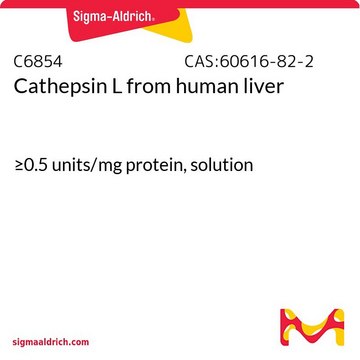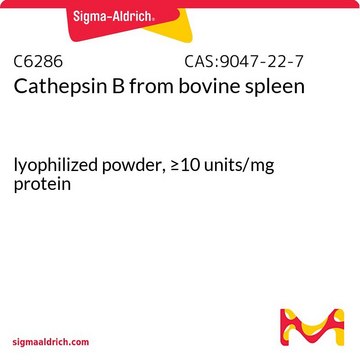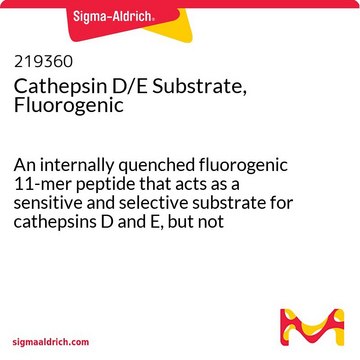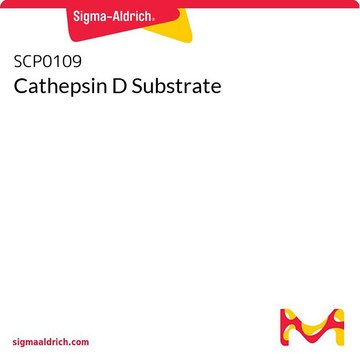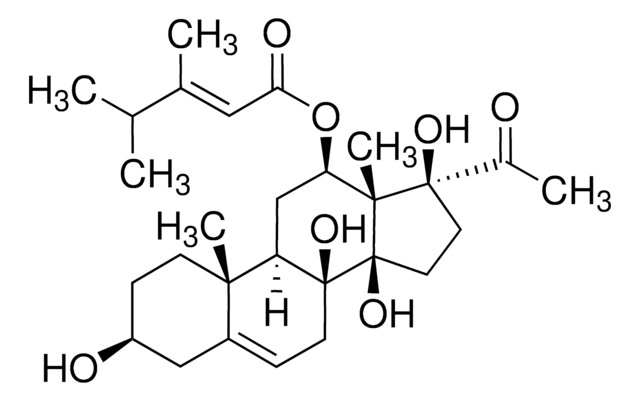C8696
Cathepsin D from human liver
lyophilized powder, ≥250 units/mg protein (E1%/280)
Sign Into View Organizational & Contract Pricing
All Photos(1)
About This Item
CAS Number:
MDL number:
UNSPSC Code:
12352204
NACRES:
NA.32
Recommended Products
form
lyophilized powder
Quality Level
specific activity
≥250 units/mg protein (E1%/280)
mol wt
~45 kDa
color
white
UniProt accession no.
storage temp.
−20°C
Gene Information
human ... CTSD(1509)
General description
Cathepsin D is an aspartic protease, which is located in lysosomes. It is involved in protein catabolism and maintains hormone and antigen processing. Cathepsin D is implicated in neoplasia and neurodegenerative changes. It regulates lysosomal proteolysis and endogenous fibrinolysis.
Application
Cathepsin D from human liver has been used:
- in β-secretase activity assay
- for enzymatic degradation of amyloid β 1-42
- in microinjection of human foreskin fibroblasts
Biochem/physiol Actions
Cathepsin D is an endosomal-lysosomal aspartic protease implicated in breast cancer metastasis and Alzheimer′s disease. Lysosomal release of cathepsin D has been found to precede cytochrome c release and loss of membrane potential in apoptotic human foreskin fibroblasts. Cathepsin D levels in PC12 cells increase 12 to 24 hours after apoptosis is induced.
Other Notes
Contains α, β and γ isoenzymes as observed by isoelectric-focusing.
Unit Definition
One unit will produce an increase in A280 of 1.0 in 30 min at pH 3.3 at 37 °C measured as TCA-soluble products using acid-denatured hemoglobin as substrate (1 cm light path).
Physical form
Powder containing sodium phosphate buffer salt.
inhibitor
related product
Storage Class Code
11 - Combustible Solids
WGK
WGK 3
Flash Point(F)
Not applicable
Flash Point(C)
Not applicable
Choose from one of the most recent versions:
Already Own This Product?
Find documentation for the products that you have recently purchased in the Document Library.
Aspartic Proteinases Physiology and Pathology (1995)
Platelet membrane beta-secretase activity in mild cognitive impairment and conversion to dementia: a longitudinal study
McGuinness B, et al.
Journal of Alzheimer'S Disease, 49(4), 1095-1103 (2016)
Gabriel C Baltazar et al.
PloS one, 7(12), e49635-e49635 (2012-12-29)
Lysosomal enzymes function optimally in acidic environments, and elevation of lysosomal pH can impede their ability to degrade material delivered to lysosomes through autophagy or phagocytosis. We hypothesize that abnormal lysosomal pH is a key aspect in diseases of accumulation
Maria Pernemalm et al.
Journal of proteome research, 12(9), 3934-3943 (2013-08-02)
In this study, we have analyzed human primary lung adenocarcinoma tumors using global mass spectrometry to elucidate the biological mechanisms behind relapse post surgery. In total, we identified over 3000 proteins with high confidence. Supervised multivariate analysis was used to
Jason S King et al.
Molecular biology of the cell, 24(17), 2714-2726 (2013-07-26)
Wiskott-Aldrich syndrome protein and SCAR homologue (WASH) is an important regulator of vesicle trafficking. By generating actin on the surface of intracellular vesicles, WASH is able to directly regulate endosomal sorting and maturation. We report that, in Dictyostelium, WASH is
Our team of scientists has experience in all areas of research including Life Science, Material Science, Chemical Synthesis, Chromatography, Analytical and many others.
Contact Technical Service

